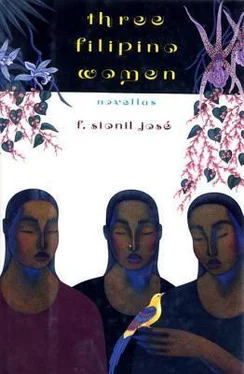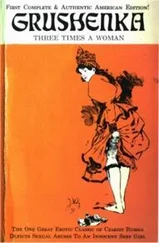“You are not all right,” I said. “Let me look at it.”
She consented after awhile. She lay down with great effort. Around her thigh was a bandage made with her green T-shirt, which she had shredded. She had just a bra beneath her old nylon jacket. The dressing — poorly done and locked with a safety pin — was drenched with dried blood. Beneath was a deep wound which cut across her thigh, the beautiful thigh that I had often caressed, still fair, unlike her lower limbs which were dark with sun and specked with insect bites.
“I was able to run,” she said, breathing deeply. “So I was able to call you. I just had a few coins for the phone and the bus.”
I carefully put the bandage back. “It must hurt a lot,” I said hoarsely, my throat gone dry. She did not reply. Physical pain was not her worry now.
She had to be in the hospital immediately. There was the possibility of infection and the wound had to be closed. She had to have a transfusion, too. But I could not take her to a hospital and to call a doctor to the motel was out of the question. The apartment — that was the best place. In the years that I was alone, I had noticed nothing unusual. I was now keen to the possibility that the house would be watched, but I was positive this was not done. No one knew of the acacia, and I doubted if any of her friends or mine knew our private nicknames.
“I will bring you to the apartment where you will stay until you are strong again.” Then, I said it and was surprised how easily the words came. “I will go with you now, wherever you will go.”
Her eyes misted. She was tired and in pain and did not argue anymore. God, I don’t know how long she had endured it.
“You know best,” she said weakly, then passed out.
I was amazed at my self-control. After I had calmly phoned the desk that we were leaving, I carried her down to the car, wondering if Dr. Alvarez, who was a family friend, would be at home, and who would be a good alternative if he was not available.
She revived when we reached the highway and she snuggled close, whimpering like a child.
Who was it who said that we all hurt the ones we love? With Malu, I did not hurt her; I killed her. Why did I have to bring her home?
We were going up the incline toward the compound when a car blocked our way. It must have been with her last reserve of strength that she swung the door open and sprinted out, limping, and to the men who had rushed out of their cars, guns drawn, I shouted “Don’t shoot! She is wounded! She cannot run!”
Flashes of fire spurted from the snouts of their guns and the bullets winked like fireflies as they hit the asphalt. Malu, my dear wife, crumpled and even when she was already dead, they still fired at her.
Born in 1924 in the township of Rosales on the island of Luzon, F. SIONIL JOSÉ is one of the foremost Filipino novelists in English, as well as a leading publisher, magazine editor, and bookseller. He found the Philippine Center of International PEN in 1958. His work has been translated widely, and he has won numerous awards, including the prestigeous Ramon Magsaysay Memorial Award *for Journalism, Literature, and Creative Communication Arts in 1980. In addition to his other novels and stories, Mr. José is well known for the Rosales Saga, a social history of the Philippines that Random House will begin to publish in 1993.
*Every year, since 1958, five Asians selected from Pakistan to Korea in the Far East, and Indonesia in Southeast Asia, are given this award, named after the famous Philippine president Ramon Magsaysay. The prize is in five categories and carries with it the sum of thirty thousand dollars.












